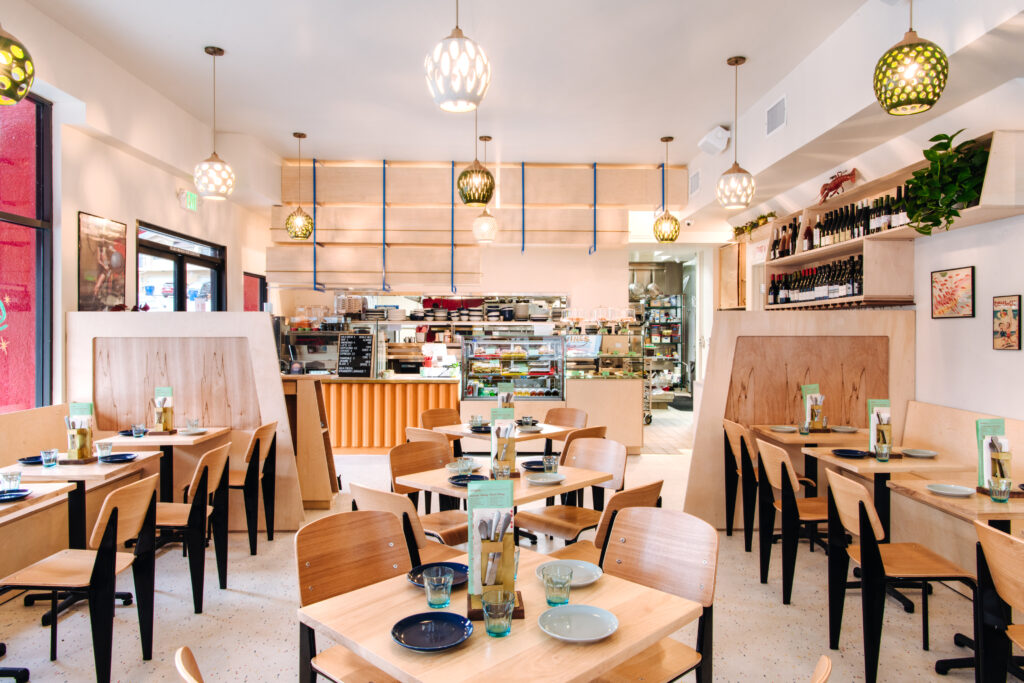A Lot on Her Plate: Alumna Lien Ta on Running Restaurants and the Power of Community

On March 12, the Los Angeles Times reviewed All Day Baby, the second restaurant from Emerson alumna Lien Ta ’03. The Times swooned, but not three days later, LA went into lockdown. (If you watched any of the Democratic National Convention last month, you may have seen Ta profiled in a video.)
It was unfortunate timing, and Ta spoke eloquently in the video about the agony of having to furlough staff just to keep the fledgling business alive. Her first restaurant, Here’s Looking At You, closed its doors indefinitely due to the pandemic.
But All Day Baby survives, and Ta and her remaining staff of six are busy, in part thanks to a collaboration with a local non-profit that helps food-insecure families. We caught up with Ta to ask about that partnership, what it takes for a business to survive a pandemic, and just how a Writing, Literature and Publishing major becomes a restaurateur.
Answers have been edited for length and clarity.
ET: Can you trace your path from Emerson to your latest restaurant?
LT: Shortly after graduation, I set off for the West Coast. I had ambitions of finding a magazine to work for, but print opportunities in LA were very scarce. I eventually landed an online gig as a reporter for E! Online. It was initially probationary; my boss, the most prevalent gossip writer at the time, wanted to see if I was cut out for the job.
My first assignment was to go to the W Hotel for the after-party of a movie called Win a Date with Tad Hamilton! and locate the actors in the movie — or any actors at all roaming the party — and interview them for sound bites fit for my boss’s very well-read celebrity gossip column. I spoke with the three most noteworthy stars: Kate Bosworth, Josh Duhamel, and Topher Grace. … I got the quotes, I filed the story — the first of many to be written in my boss’s signature “voice” — and I stayed with him for nearly two years covering celebrity culture. My only byline looked like this: “Additional bitchin’ reporting by Lien Ta.” I was good at my job, and it was, in fact, a job. But I never quite found a taste for this sort of content.
I would eventually move on to an editor position at a revamp of a site with a formidable URL: Movies.com. It was to be reimagined by the founder of E! Online, Lew Harris, who to this day, I consider a mentor. I had no experience as an editor, but Lew hired me over a more qualified candidate with experience at Variety, concluding that, despite my lack of experience, he could see himself “getting along” with me better. Even today, I find myself hiring in a similar way.
Movies.com was a dream job, if only for the fact that it was a privilege to work under Lew’s direction. It would later be sold to another company, and I would find myself jobless, but [I got] a new mid-level editor job quickly — Hollywood.com. Despite a promotion to managing editor, my breaking point was when both Farrah Fawcett and Michael Jackson died on the same day. I could no longer participate in the salacious coverage that was, and still is, celebrity news. I thought, let the blogs do it. But it did leave me to wonder, and even panic a little, what was I going to do?
I couldn’t think of anything I loved more than food. And not just food, but the experience of dining at a restaurant. Before my father died, he and I would fantasize about opening a small noodle shop together. It never seemed serious, but at this particular crossroads in my life, I was suddenly taking it seriously. I told myself: I’m going to open a restaurant.
So, I quit my job, and I blindly mapped out a plan. The first step was to gain some experience (I had never worked at a restaurant before!). Over the course of five years, I convinced restaurants and bars to hire me as a hostess, cashier, brunch server, wine bar server, tiki cocktail waitress, kitchen stagiaire, and finally floor manager. I learned about wine in school, I learned about the world of mixology. I opened a Twitter account to follow the endless coverage of food all over the world and “meet” all the players. All of this was my education.
It would be well over a year of working together before I would realize that my most talented coworker would later become my business partner and the chef of my two restaurants [chef Jonathan Whitener]. All along, I knew that I would need a chef — I don’t cook a lick of food, even for myself. My devotion to the business was for the experience. So many times as a restaurant diner, I would get enraptured by moments, a sense of feeling cared for. And I wanted to provide that care using my chef’s cooking.
The process of figuring out how to open a restaurant is, in many ways, harder than trying to keep one alive and running. But operating a restaurant is not unlike the job of an editor’s. It requires a vision. It requires players of many talents. You are the architect of a bigger picture, and there needs to be a story compelling enough to drive traffic again, again, and again.

ET: You and All Day Baby were highlighted at the DNC as a business that is struggling with the fallout of the pandemic. How are you and your team doing?
LT: We are maximizing each day and enjoying each other’s company. There are just six of us left, along with Chef and myself (reduced from a team of 65). Our first restaurant, Here’s Looking At You, is closed indefinitely. I still receive letters from guests sharing with me their memorable moments of dining at HLAY.
We are lucky to still be operating All Day Baby in a takeout format, and it’s still our best day ever to receive our loyal guests at our pickup window. Business is active, but like a lot of businesses, it’s not like before. And yet we all still have the same financial commitments. It’s challenging, but ultimately, this is a game of waiting and survival.
ET: What do restaurants need in order to survive this pandemic?
LT: Restaurants are highly dependent on cash flow. We all need consistent revenue that is comparable to our set bills and spending. We need to generate sales in the traditional sense by way of guests. While all of this was painfully compromised at the beginning of the pandemic, we still have an opportunity to develop and reimagine ways in which we can still serve and still provoke a sale.
However, depending on consumers alone at this time is not enough. Restaurants, unable to operate at full capacity right now, need landlords willing to amend lease obligations to alleviate financial burden. And frankly, we need help from the federal government. Currently, we are fighting for the RESTAURANTS Act to get passed within Congress. It is a restaurant stabilization fund that would save 11 million jobs and generate over $270 billion in economic benefits.
ET: Can you talk about your relationship with El Nido Family Centers?
LT: El Nido is a wonderful non-profit organization dedicated to empowering low-income families all across greater LA. They’ve been doing so for 95 years, but throughout this pandemic, they have helped to distribute over $5 million in government aid to families struggling to pay rent or purchase groceries.
El Nido has their hands full these days, but they were still willing to form a partnership with All Day Baby, in which we sought out donations to help provide the restaurant with a job to do: feeding food-insecure families in the Watts community. So far, we have raised over $8,000. Along with my coworker Edgar, we deliver these meals door-to-door every Thursday after work, which is a slower day of business at the restaurant. Every little bit of work right now helps us with keeping the lights on.
ET: Is there anything you think you’ll do differently in your restaurant (or double down on) once things return to something close to normal?
LT: As many of us have experienced a loss of income (I, myself, was on unemployment benefits for three months), I think we’ve all learned how to cut corners and find ways to save money. When running a restaurant, you’re always trying to find ways to money-pinch, but this pandemic has taught us that there is still room to [find ways] of conserving resources. Additionally, I think that the pandemic has illuminated a magical side to humanity. The outpouring of support has been tremendous, and that display of kindness has further magnified the opposite kind of behavior.
I’ve, heartbreakingly, had to witness my staff manage escalating circumstances in which guests will be indignant about wearing a mask, practicing physical distancing, or participating in contactless pay. We’ve, of course, seen viral videos of such behavior in grocery stores and the like. And for me, it just conjures up old memories of unfortunate behavior in past dining experiences, that we, as a hospitality industry, have tolerated for a long time. I would love to believe that we can all be kinder to each other, but as the leader of my restaurant, I owe it to my staff and to myself to stand up for our own integrity and no longer excuse or make excuses for such inappropriate human etiquette.
ET: Are there ways your experience at Emerson or your Emerson education have influenced you, either professionally or personally?
LT: I found college to be quite challenging. I was not naturally a great academic student. For the better part of my time at Emerson, it was difficult for me to find a sense of purpose — reasons to motivate myself to do well in school. It wasn’t until I was a reluctant student in a Magazine Writing class, wherein I rushed to meet deadlines minutes before stories were due, that my professor would later tell me that I was a good writer. English was my third language, which I never spoke at home, and it still astonishes me that I can form meaningful sentences in this language.
When I was a junior, a [fellow student and I] would launch the school’s first glossy magazine, and we would call it Gauge. The startup of Gauge reminds me so much of the startup of each of my two restaurants. I’m so indebted to Emerson for the incredible life opportunity that was that magazine.
ET: What do you love most about the restaurant business?
LT: There is a constant opportunity to form authentic connections with people, something I was missing in my former career. I love forging relationships, big or small, with my guests — usually first propelled by a good first bite of food. And with my staff, I am honored by the privilege to provide them a job, and the unique opportunity to form leaders all by identifying their strengths and motivations.
ET: What’s your go-to comfort food?
LT: A juicy cheeseburger with plenty of sauce.
Categories